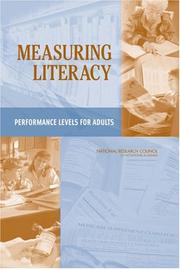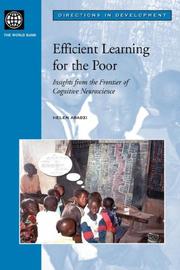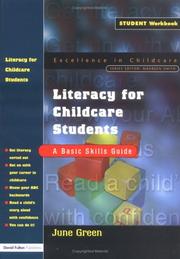| Listing 1 - 10 of 40 | << page >> |
Sort by
|
Book
ISBN: 9264273352 9264273174 Year: 2017 Publisher: Paris : OECD,
Abstract | Keywords | Export | Availability | Bookmark
 Loading...
Loading...Choose an application
- Reference Manager
- EndNote
- RefWorks (Direct export to RefWorks)
Functional literacy. --- Adult literacy --- Functional illiteracy --- Life skills --- Literacy
Book
ISBN: 9264799001 9264604669 9264811079 Year: 2019 Publisher: Paris : OECD,
Abstract | Keywords | Export | Availability | Bookmark
 Loading...
Loading...Choose an application
- Reference Manager
- EndNote
- RefWorks (Direct export to RefWorks)
Functional literacy. --- Adult literacy --- Functional illiteracy --- Life skills --- Literacy
Book
ISBN: 9264972102 9264592725 Year: 2019 Publisher: Paris : OECD,
Abstract | Keywords | Export | Availability | Bookmark
 Loading...
Loading...Choose an application
- Reference Manager
- EndNote
- RefWorks (Direct export to RefWorks)
Functional literacy. --- Adult literacy --- Functional illiteracy --- Life skills --- Literacy

ISBN: 1280286407 9786610286409 0309550157 9780309550154 9781280286407 0309096529 9780309096522 661028640X 0309165180 9780309165181 Year: 2005 Publisher: Washington, DC : National Academies Press,
Abstract | Keywords | Export | Availability | Bookmark
 Loading...
Loading...Choose an application
- Reference Manager
- EndNote
- RefWorks (Direct export to RefWorks)
Functional literacy --- Literacy. --- Illiteracy --- Education --- General education --- Adult literacy --- Functional illiteracy --- Life skills --- Literacy --- Evaluation.
Book
ISBN: 9282605620 Year: 1991 Volume: vol *450
Abstract | Keywords | Export | Availability | Bookmark
 Loading...
Loading...Choose an application
- Reference Manager
- EndNote
- RefWorks (Direct export to RefWorks)
Labour market --- European Union --- Literacy --- Alphabétisation --- Functional literacy --- Congresses. --- -Adult literacy --- Functional illiteracy --- Life skills --- Congresses --- -Congresses --- Alphabétisation --- Adult literacy
Book
ISBN: 0872071227 Year: 1994 Publisher: Newark International reading association
Abstract | Keywords | Export | Availability | Bookmark
 Loading...
Loading...Choose an application
- Reference Manager
- EndNote
- RefWorks (Direct export to RefWorks)
Adult education --- Functional literacy --- Adult literacy --- Functional illiteracy --- Life skills --- Literacy --- Adults, Education of --- Education of adults --- Education --- Continuing education --- Open learning
Book
ISBN: 9789264281110 9789264284203 9789264297364 Year: 2017 Publisher: Paris, [France] : OECD,
Abstract | Keywords | Export | Availability | Bookmark
 Loading...
Loading...Choose an application
- Reference Manager
- EndNote
- RefWorks (Direct export to RefWorks)
Functional literacy --- Functional literacy. --- Literacy. --- Adult education. --- Adults, Education of --- Education of adults --- Education --- Continuing education --- Open learning --- Illiteracy --- General education --- Adult literacy --- Functional illiteracy --- Life skills --- Literacy

ISBN: 0821366882 0821366890 9780821366882 9786610503575 1280503572 Year: 2006 Publisher: Washington, DC, USA : World Bank,
Abstract | Keywords | Export | Availability | Bookmark
 Loading...
Loading...Choose an application
- Reference Manager
- EndNote
- RefWorks (Direct export to RefWorks)
Large-scale efforts have been made since the 1990's to ensure that all children of the world go to school. But mere enrollment is not sufficient, students must become fluent in reading and calculation by the end of grade 2. Fluency is needed to process large amounts of text quickly and use the information for decisions that may ultimately reduce poverty. State-of-the-art brain imaging and cognitive psychology research can help formulate effective policies for improving the basic skills of low-income students. This book integrates research into applications that extend from preschool brain development
Teaching --- Developing countries --- Literacy --- Functional literacy --- Learning --- Cognitive neuroscience --- Cognitive neuropsychology --- Cognitive science --- Neuropsychology --- Adult literacy --- Functional illiteracy --- Life skills --- Physiological aspects. --- Social aspects.
Book
ISBN: 0821354930 9786610086337 1280086335 Year: 2003 Publisher: Washington, D.C. : World Bank,
Abstract | Keywords | Export | Availability | Bookmark
 Loading...
Loading...Choose an application
- Reference Manager
- EndNote
- RefWorks (Direct export to RefWorks)
There are about one billion adult illiterates in the world, but teaching them basic literacy often turns out to be harder than expected. Adult literacy programs in developing countries often have low efficiency and rather limited outcomes. To improve outcomes, much emphasis has been given on empowering non-governmental organizations, increasing learner motivation, and reinforcing social benefits. However, the mechanisms that make it possible for the brain to perceive and interpret written patterns in a few milliseconds have received little attention. There is considerable research in this area, often carried out in developed countries to understand dyslexia or to map brain functions. That has not yet been put into use by the adult literacy community. This book summarizes the pertinent research using layman terms and attempts to apply it to the acquisition of adult literacy.; What do people learning a new script need in order to understand a text? Perhaps the most important requirement is time. The working memory, which serves as a storage of material being read lasts only about 12 seconds and holds about seven items. If people read slowly and laboriously, by the end of the sentence, they may forget the beginning. To overcome the limitations of human memory, reading must become automatic, fast and effortless. The challenge is how to achieve this performance level in literacy classes that last a few months. This book presents issues and ideas on designing adult literacy programs that support human memory functions as understood in 2003.
Social stratification --- Social problems --- Adult education. Lifelong learning --- Developing countries --- Functional literacy --- Cognitive learning. --- Education --- Social Sciences --- Education, Special Topics --- Learning --- Adult literacy --- Functional illiteracy --- Life skills --- Literacy

ISBN: 0367089742 1315064839 1134007302 9781134007301 1843120224 9781843120223 9781315064833 9781134007370 9781134007448 113400737X Year: 2003 Publisher: London
Abstract | Keywords | Export | Availability | Bookmark
 Loading...
Loading...Choose an application
- Reference Manager
- EndNote
- RefWorks (Direct export to RefWorks)
This pack offers the busy tutor all they need to teach their childcare students literacy.This pack offers the busy tutor all they need to teach their childcare students literacy. The book includes:* Pages of spelling quizzes* Pages for building their bank of familiar words* Extension activities which build on what they've learned in lessonsThe students will be able to chart their own progress as they work through the levels.
Functional literacy. --- Child care workers --- Cottage parents --- Group parents --- House parents --- Workers, Child care --- Adult literacy --- Functional illiteracy --- Life skills --- Literacy --- Training of. --- Training of
| Listing 1 - 10 of 40 | << page >> |
Sort by
|

 Search
Search Feedback
Feedback About UniCat
About UniCat  Help
Help News
News